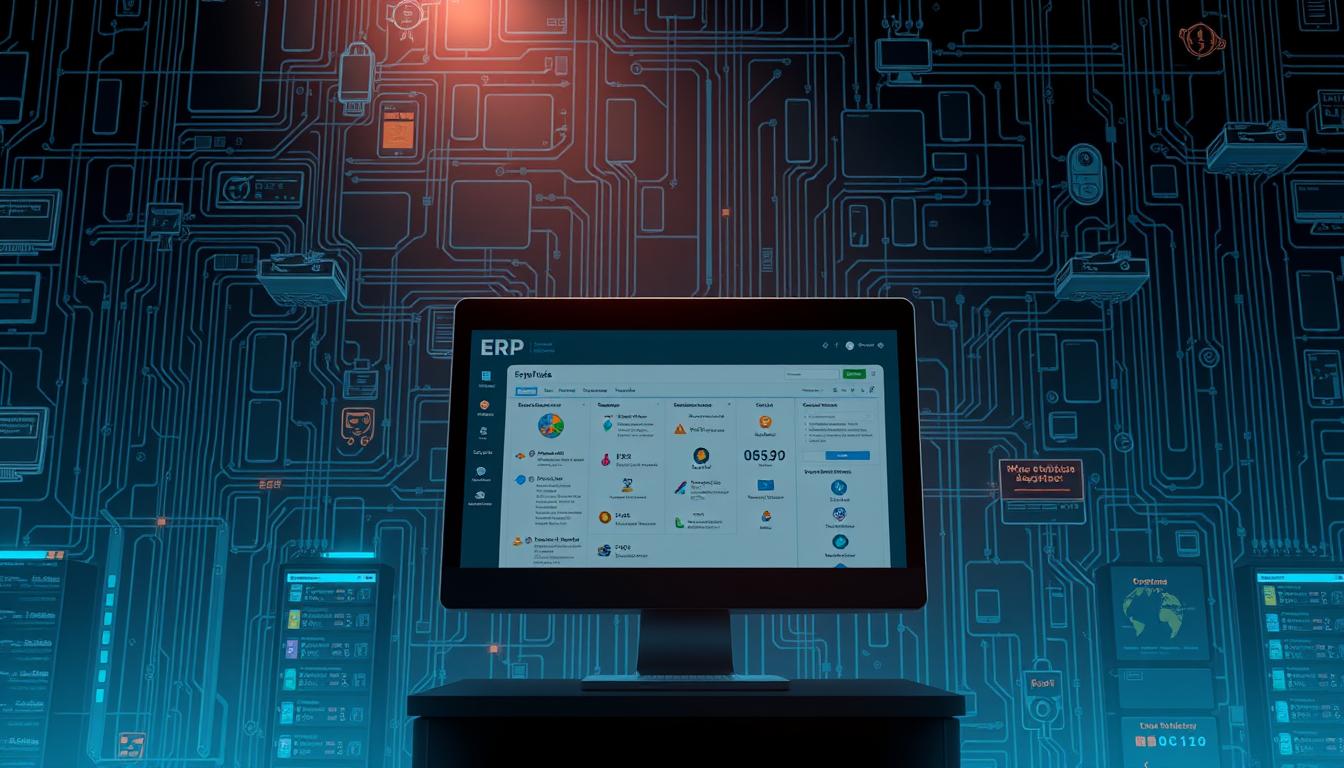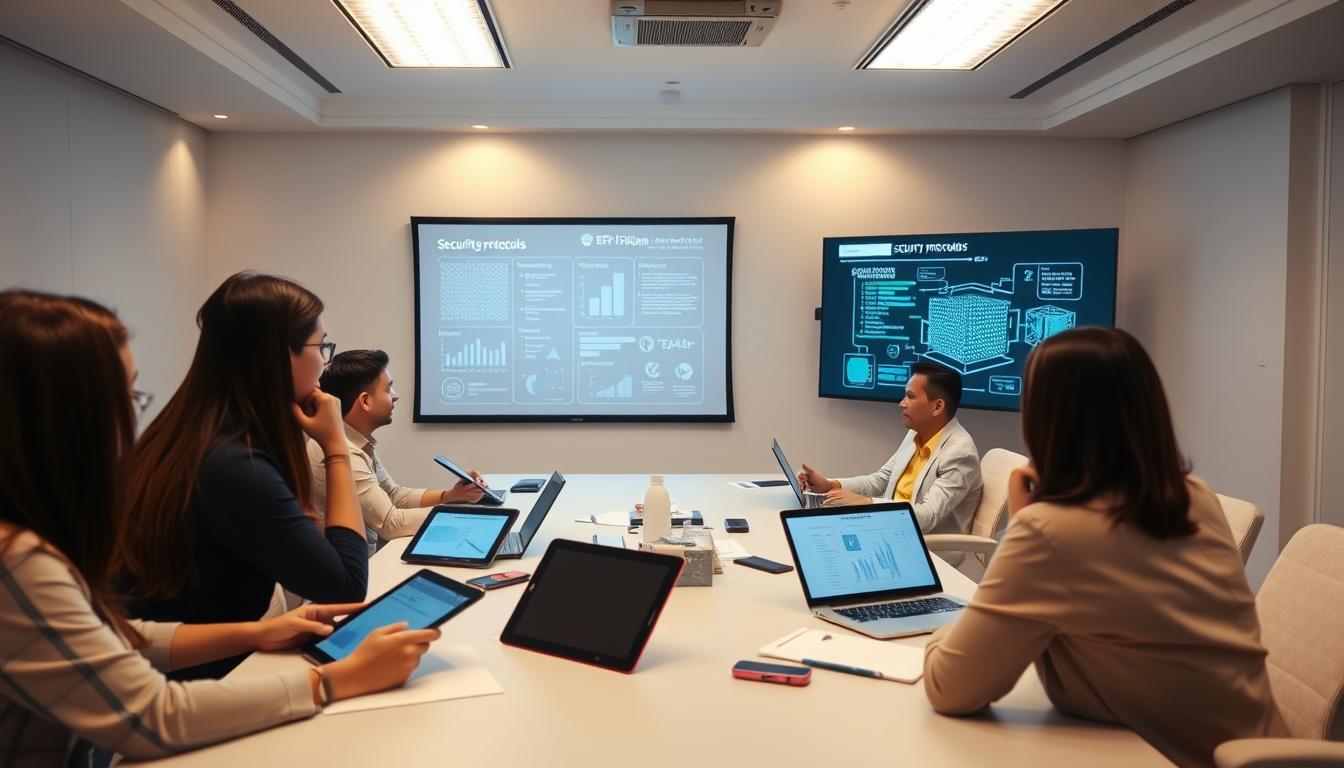Have you thought about how vulnerable your business could be if your ERP system was hacked? ERP systems are connected, making them a big target for cyber attacks. In the Philippines, more SMEs are using these systems to manage their business. It’s key to understand ERP system risks and use strong security measures.
With the right risk management, you can protect your data and keep your business running smoothly. This includes getting good Post-Implementation Support. It’s all about keeping your ERP system safe and secure.
Key Takeaways
- Understanding ERP system risks is crucial for safeguarding sensitive data.
- Implementing effective security protocols can mitigate many potential threats.
- Constant risk management is essential for SMEs in the evolving digital landscape.
- Post-Implementation Support enhances the security of your ERP system.
- Creating a culture of security awareness among employees is vital for protection.
- Regular updates and maintenance can help prevent vulnerabilities in your system.
Understanding ERP System Risks
ERP systems help make business processes smoother by combining finance, human resources, and supply chain management. This makes them a big target for hackers, leading to serious security threats.
What are ERP Systems?
ERP stands for Enterprise Resource Planning. It’s software that brings together different parts of a company into one place. This makes things more efficient and helps with making quick decisions. Small and medium businesses in the Philippines use them a lot.
As they rely more on data, the chance of data breaches grows. This shows why strong security is so important.
Common Risks Associated with ERP Systems
Companies need to know about the dangers ERP systems face. The main risks are:
- Unauthorized access, which can cause data leaks.
- Misconfigurations that can reveal sensitive info.
- Old software that can’t fight off new threats, making data breaches more likely.
A study found that 64% of companies face ERP system breaches. This highlights the need for better security. Taking steps to protect data keeps business processes safe and sound.
Companies can find ways to protect data at safeguarding sensitive data. Not dealing with these risks can harm security and business success.
The Importance of Security Protocols
In the world of ERP systems, security protocols are key to keeping sensitive information safe. They act as a shield against cyber threats, which are getting smarter every day. It’s vital for businesses to understand their role in protecting data.
Why Security Protocols are Essential
Security protocols set up rules to keep data safe from unauthorized access. They guide users and make sure companies follow the law. In the Philippines, where data breaches can lead to big fines, strong protocols are crucial. They help protect data and improve a company’s image with clients and partners.
Impact of Inadequate Security on Businesses
Insufficient security can lead to big problems. It lets cyber threats in, causing financial losses and losing customer trust. Companies might face legal issues and damage to their reputation.
In the Philippines, companies that don’t focus on data protection can get hit with huge fines. They also suffer from long-term damage to their reputation.
Identifying Vulnerabilities in Your ERP System
Keeping your ERP system safe is key. It starts with finding and fixing weak spots. Businesses need to watch out for common issues that can put them at risk. They must focus on making their system strong and secure.
Common Vulnerabilities to Look For
Here are some common problems to watch out for:
- Misconfigured Access Controls: If access controls are wrong, anyone can get in.
- Outdated Software Components: Not updating can leave you open to attacks.
- Ineffective Password Policies: Weak passwords invite hackers in.
- Insufficient Data Backup Practices: Bad backups mean you could lose data in a crisis.
The Role of System Configuration in Security
Good system management is vital for safety. It helps block threats from outside and inside. Regular checks help find and fix problems.
In the Philippines, small and medium businesses often overlook this. But, with thorough checks and updates, they can make their systems much safer. This leads to better security for everyone.
Effective Security Measures to Implement
Protecting ERP systems from threats is key. Focus on access control, data encryption, and monitoring tools. These steps help safeguard sensitive data and boost overall security.
Robust Access Control Mechanisms
Setting up strong access controls is essential. Role-Based Access Control (RBAC) limits user access to what they need. Adding Multi-Factor Authentication (MFA) makes it harder for unauthorized access. These steps improve security and reduce risks.
Data Encryption Strategies
Data encryption is a strong defense against breaches. It keeps data safe, whether it’s stored or moving. Using AES encryption is a good choice to protect your data.
Continuous Monitoring and Anomaly Detection
Monitoring tools are crucial for real-time analysis. They spot unusual activity that might be a breach. With anomaly detection, you can act fast to protect your data.
Developing an ERP Security Strategy
Creating a strong security plan for an ERP system is key. It starts with regular risk assessments to find weak spots and threats. Getting input from different departments helps make the security plan fit with the company’s goals. This way, companies can better protect their ERP systems.
Conducting Regular Risk Assessments
A thorough risk assessment finds vulnerabilities and looks at the chances and effects of threats. This step helps focus on the biggest risks first. Regular checks keep the security plan up to date with new cyber threats.
Setting Up Incident Response Plans
Having a good incident response plan is crucial for handling security breaches. A clear plan makes sure everyone knows their role and gets the right help fast. This helps keep business running smoothly even when there’s a problem.
| Assessment Factor | Description | Action Plan |
|---|---|---|
| Frequency of Assessment | Regular intervals, at least quarterly | Schedule assessments and notify stakeholders |
| Stakeholder Engagement | Involvement of various departments | Organize workshops and meetings for input |
| Incident Response Procedures | Clearly defined protocols for breaches | Develop and distribute response documentation |
| Review and Update | Continuously refine the strategy | Implement feedback and adapt plans as necessary |
By regularly checking these areas, the security plan gets better. This makes the system more resilient against new cyber threats.
Vendor Selection and Software Considerations
In today’s digital world, picking the right ERP system is key. It’s important to choose vendors who focus on security. Businesses should check if the vendor’s security matches their needs.
Choosing an ERP Vendor with a Security Focus
Start by looking at the vendor’s security commitment. Check their past responses to security threats. Also, look for vendors with strict security standards, like ISO certifications.
Evaluating Software Features for Security
It’s also crucial to examine the software’s security features. SMEs in the Philippines should look for:
- Data Encryption: This ensures sensitive info is safe during and after transmission.
- Access Control: This lets you control who can see or change data in the ERP system.
- Regular Updates: Updates that fix new threats show the vendor cares about security.
Choosing the right ERP vendor is vital for system security. A smart choice in vendor and strong software features lead to a secure ERP system.
Post-Implementation Support for ERP Security
Keeping an ERP system safe doesn’t stop after it’s set up. Post-Implementation Support is key to keeping it secure. Companies need to keep their systems updated and maintained to fight off new threats. Good support helps find and fix weak spots, making the ERP system strong and safe.
Ongoing Maintenance and Updates
Keeping the system up to date is part of ongoing maintenance. This stops hackers from using known weaknesses. Regular checks also make sure the system meets current security standards. Because cyber threats change fast, it’s important to be quick to update and protect against new dangers.
Training Employees on Security Best Practices
Teaching employees about security is vital. It makes everyone understand the importance of following safety rules. Training should cover things like spotting phishing scams, keeping passwords safe, and protecting data. In the Philippines, teaching employees well can greatly lower the risk of mistakes that could harm the ERP system.
The Role of Compliance in ERP Security
Compliance is key to keeping ERP systems safe. Businesses must follow many data protection laws. Knowing these rules helps create strong security plans.
Staying compliant protects important data. It also builds trust with customers and partners.
Understanding Regulatory Requirements
Companies must know the rules that apply to them. Laws like the General Data Protection Regulation (GDPR) set clear rules for data handling. Local laws, like those in the Philippines, can also pose challenges.
Understanding these laws helps businesses set up secure practices. It builds a culture of responsibility.
How Compliance Affects Security Protocols
Compliance shapes how companies manage their systems. Following the rules helps avoid legal trouble and reduces data breach risks. Not following the rules can lead to big fines or harm to reputation.
Companies should always check their security to match the laws. This keeps them safe from threats.
| Regulatory Requirement | Description | Impact on Security Protocols |
|---|---|---|
| GDPR | Regulates data protection and privacy for individuals in the EU and EEA. | Requires encryption and strict access controls. |
| Philippine Data Privacy Act | Safeguards personal information through consent and transparency. | Mandates data breach notification and risk assessment. |
| HIPAA | Governs the privacy and security of health information. | Requires data integrity measures and employee training. |
Conclusion
Managing ERP system risks is key for business success. Strong ERP security keeps data safe and makes the whole organization stronger. For small and medium businesses in the Philippines, knowing and tackling risks is very important.
Cyber threats are getting smarter, so ERP security is a must. It protects important data and keeps operations running smoothly. Regular updates and training help businesses stay ready for new risks.
By focusing on security and managing risks well, small and medium businesses can grow. They can secure their place in the market and earn the trust of their clients and partners.
FAQ
What are ERP systems?
ERP systems are software solutions that manage key business areas like inventory and accounting. They bring together important functions into one system. This makes operations smoother across an organization.
What are common risks associated with ERP systems?
Risks include data breaches and unauthorized access. Misconfigurations and outdated software also pose threats. These can expose sensitive data to cyber attacks and harm efficiency.
Why are security protocols essential for ERP systems?
Security protocols protect ERP systems by setting rules to prevent unauthorized access. They help avoid data breaches and legal issues. This ensures business continuity.
What impact does inadequate security have on businesses?
Poor security can cause big financial losses and damage a company’s reputation. It can also lead to legal problems due to non-compliance. This is a big worry for businesses with sensitive data.
What common vulnerabilities should I look for in my ERP system?
Look out for misconfigured access controls and outdated software. Also, check for missing security patches. These can make systems vulnerable to attacks.
How does system configuration play a role in security?
Proper configuration ensures access controls are set right. It also sets up defenses against threats. This includes both external attacks and insider threats.
What are some effective security measures to implement in ERP systems?
Use strong access controls like Role-Based Access Control (RBAC) and Multi-Factor Authentication (MFA). Also, encrypt sensitive data both at rest and in transit.
How can continuous monitoring help with ERP security?
Continuous monitoring uses tools to check user behavior and system activity in real-time. It helps spot and respond to threats quickly.
What is the significance of conducting regular risk assessments?
Regular risk assessments find vulnerabilities and threats. They help tailor security strategies. This improves defenses against cyber threats.
Why is it important to have an incident response plan?
An incident response plan helps manage security breaches well. It minimizes impacts and guides quick and effective responses.
How do I choose an ERP vendor with a security focus?
Look at their security protocols and how they handle vulnerabilities. Check if they follow strict security standards. This ensures a reliable partner.
What software features should I evaluate for security?
Check for encryption, access control, and update schedules. These are key for keeping your ERP system secure.
What role does ongoing maintenance play in ERP security?
Regular updates and patch management are crucial. They protect ERP systems from known vulnerabilities. This keeps them secure.
How important is employee training on security best practices?
Training employees on security is vital. It helps reduce risks from human errors. It builds a culture of security awareness.
What regulatory requirements should I be aware of for ERP security?
Know laws like GDPR and local Philippine regulations. Understanding these helps align protocols. It reduces legal risks and protects data.
How does compliance affect my security protocols?
Compliance is key to protecting sensitive data. It reduces legal risks and builds trust. It helps navigate data protection regulations.



